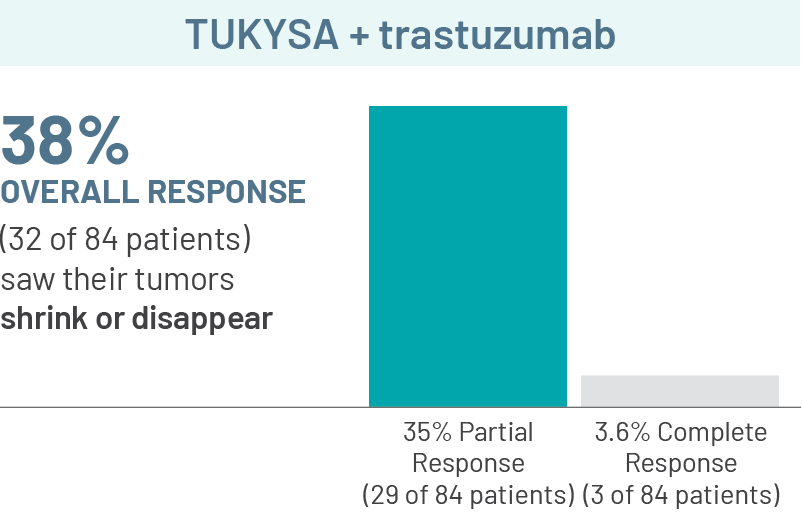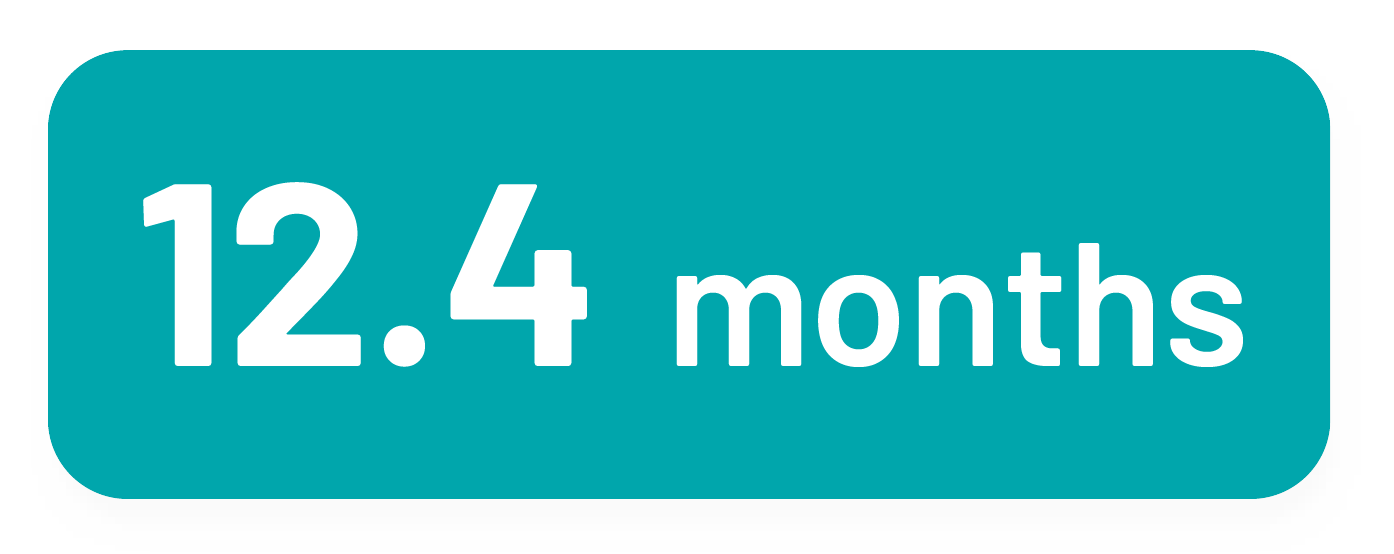INDICATION:
What is TUKYSA? TUKYSA is a prescription medicine used to treat adults with:
- a type of breast cancer called human epidermal growth factor receptor-2 (HER2) positive breast cancer. TUKYSA is used with the medicines trastuzumab and capecitabine, when your cancer has spread to other parts of the body such as the brain (metastatic), or cannot be removed by surgery, and you have received one or more anti-HER2 breast cancer treatments.
- a type of colorectal cancer called RAS wild-type HER2 positive colorectal cancer. TUKYSA is used with the medicine trastuzumab, when your cancer has spread to other parts of the body (metastatic), or cannot be removed by surgery, and you have received treatment with fluoropyrimidine-, oxaliplatin-, and irinotecan-based chemotherapy and it did not work or is no longer working. This use is approved based on a clinical study that measured how many patients had a tumor response and how long that response lasted. Studies are ongoing to confirm the benefit of TUKYSA for this use.
It is not known if TUKYSA is safe and effective in children.
What is TUKYSA? TUKYSA is a prescription medicine used with the medicines trastuzumab and capecitabine to treat adults with human epidermal growth factor receptor-2 (HER2) positive breast cancer that has spread to other parts of the body such as the brain (metastatic), or that cannot be removed by surgery, and who have received one or more anti-HER2 breast cancer treatments. It is not known if TUKYSA is safe and effective in children.
What is TUKYSA? TUKYSA is a prescription medicine used with the medicine trastuzumab to treat adults with RAS wild-type human epidermal growth factor receptor-2 (HER2) positive colorectal cancer that has spread to other parts of the body (metastatic), or cannot be removed by surgery, and who have received treatment with fluoropyrimidine-, oxaliplatin-, and irinotecan-based chemotherapy and it did not work or is no longer working. This use is approved based on a clinical study that measured how many patients had a tumor response and how long that response lasted. Studies are ongoing to confirm the benefit of TUKYSA for this use. It is not known if TUKYSA is safe and effective in children.

Results With the TUKYSA Regimen*
TUKYSA (tucatinib) is a targeted, chemotherapy-free†
treatment. It is taken with another medicine called trastuzumab (also
called Herceptin®).
TUKYSA was approved based on results from a clinical trial called
MOUNTAINEER. TUKYSA is for adults with RAS wild-type, HER2
positive colorectal cancer that has spread to other parts of the body
(metastatic), or cannot be removed by surgery, and who have received
treatment with fluoropyrimidine-, oxaliplatin-, and irinotecan-based
chemotherapy and it did not work or is no longer working.
On this page, you can learn more about:
- How TUKYSA was studied
- Results from the clinical study

TUKYSA Was Studied in a Clinical Trial Called MOUNTAINEER
MOUNTAINEER included 84 people with RAS wild-type, HER2+ colorectal cancer that could not be removed by surgery (unresectable) or had spread to other parts of the body (metastatic).
To participate in this study, these adults must have:
- Previously received fluoropyrimidine-, oxaliplatin-, and irinotecan-based chemotherapy (some patients had also received immunotherapy)
- Had tumors that were both RAS wild type and HER2+
- Never received any therapy that targets HER2
The trial only studied people receiving TUKYSA and trastuzumab. Because they were not directly compared to people receiving any other treatment for RAS wild-type, HER2+ metastatic colorectal cancer, no conclusions can be drawn about the relative effectiveness of TUKYSA + trastuzumab and other treatments.
With the TUKYSA regimen,* some people saw their tumors shrink

- Tumors shrink, or “partial response,” means that the amount of cancer in the body, or the size of the tumor, decreased after treatment
- Tumors disappear, or “complete response,” means that all signs of cancer were gone after treatment. This doesn’t mean that cancer was cured
- Overall response rate is the percentage of patients whose cancer shrinks or disappears after treatment
TUKYSA + trastuzumab will not work for everyone. Individual results may vary.
How long did patients respond to TUKYSA + trastuzumab treatment?
Another outcome that was measured in the clinical trial in patients who responded to treatment was the duration of response (DOR). This is the length of time that tumors continued to respond to treatment. The clinical trial also measured the median DOR. Median is defined as the middle number in a group of numbers arranged from lowest to highest.
For the 32 of 84 patients who responded to treatment in the clinical trial:
 Median duration of response
Median duration of response
*The TUKYSA regimen includes trastuzumab. The TUKYSA regimen may not work for everyone.


Important Safety Information

What are the possible side effects of TUKYSA?
TUKYSA may cause serious side effects, including:
- Diarrhea (watery, loose, or frequent stools) is common and can sometimes be severe. Tell your healthcare provider if you have a change in your bowel movements or severe diarrhea. Severe diarrhea can cause a loss of too much body fluids (dehydration), low blood pressure, kidney problems, and death. Your healthcare provider may prescribe medicines to treat your diarrhea during treatment with TUKYSA.
- Liver Problems, including severe cases. Your healthcare provider will test your blood to check your liver function before starting and every 3 weeks during treatment with TUKYSA, or as needed. Tell your healthcare provider right away if you have any signs and symptoms of liver problems including itching, yellowing of your skin or eyes, dark or brown urine (tea-colored), pain in the right upper stomach area (abdomen), feeling very tired, decreased appetite, or bleeding or bruising more easily than normal.
The most common side effects of TUKYSA in combination with trastuzumab and capecitabine in adults with HER2-positive breast cancer include:
- diarrhea
- rash, redness, pain, swelling, or blisters on the palms of your hands or soles of your feet
- nausea
- increased liver function blood tests
- vomiting
- mouth sores (stomatitis)
- decreased appetite
- a low number of red blood cells (anemia)
- rash
The most common side effects of TUKYSA in combination with trastuzumab in adults with RAS wild-type HER2-positive colorectal cancer include:
- diarrhea
- tiredness
- rash
- nausea
- stomach-area (abdomen) pain
- infusion-related reactions
- fever
TUKYSA may cause fertility problems in males and females, which may affect the ability to have children. Talk to your healthcare provider if you have concerns about fertility.
These are not all the possible side effects of TUKYSA. Discuss side effects with your healthcare provider. You may report side effects to FDA at 1-800-FDA-1088 or www.fda.gov/Safety/MedWatch.
These are not all the possible side effects of TUKYSA. Discuss side effects with your healthcare provider. You may report negative side effects to the FDA at 1-800-FDA-1088 or www.fda.gov/Safety/MedWatch.

What should I tell my healthcare provider before taking TUKYSA?
Before taking TUKYSA, tell your healthcare provider about all of your medical conditions, including if you:
- have liver problems.
-
are pregnant or plan to become pregnant. TUKYSA can harm your unborn
baby.
Females who can become pregnant: Your healthcare provider will do a pregnancy test before you start taking TUKYSA. Use effective birth control (contraception) during TUKYSA treatment and for 1 week after the last dose of TUKYSA. Tell your healthcare provider right away if you become pregnant or think you may be pregnant during treatment with TUKYSA.
Males with a female partner who can become pregnant: Use effective birth control during TUKYSA treatment and for 1 week after the last dose of TUKYSA. - are breastfeeding (nursing) or plan to breastfeed. Do not breastfeed during treatment with TUKYSA and for 1 week after the last dose of TUKYSA.
Tell your healthcare provider about all the medicines you take, including prescription and over-the-counter medicines, vitamins, and herbal supplements. TUKYSA may affect the way your other medicines work, and other medicines may affect the way TUKYSA works. Keep a list of all the medicines you take and show it to your healthcare provider and pharmacist every time you get a new medicine.
REF-8290_FINAL_01/23
Indication
Indication

What is TUKYSA?
TUKYSA is a prescription medicine used with the medicine trastuzumab to treat adults with RAS wild-type human epidermal growth factor receptor-2 (HER2) positive colorectal cancer that has spread to other parts of the body (metastatic), or cannot be removed by surgery, and who have received treatment with fluoropyrimidine-, oxaliplatin-, and irinotecan-based chemotherapy and it did not work or is no longer working.
This use is approved based on a clinical study that measured how many patients had a tumor response and how long that response lasted. Studies are ongoing to confirm the benefit of TUKYSA for this use.
It is not known if TUKYSA is safe and effective in children.
Please see Important Facts about TUKYSA.
TUKYSA is a prescription medicine used to treat adults with:
- a type of breast cancer called human epidermal growth factor receptor-2 (HER2) positive breast cancer. TUKYSA is used with the medicines trastuzumab and capecitabine, when your cancer has spread to other parts of the body such as the brain (metastatic), or cannot be removed by surgery, and you have received one or more anti-HER2 breast cancer treatments.
-
a type of colorectal cancer called RAS wild-type HER2
positive colorectal cancer. TUKYSA is used with the medicine
trastuzumab, when your cancer has spread to other parts of the
body (metastatic), or cannot be removed by surgery,
and you have received treatment with
fluoropyrimidine-, oxaliplatin-, and irinotecan-based
chemotherapy and it did not work or is no longer working.
This use is approved based on a clinical study that measured how many patients had a tumor response and how long that response lasted. Studies are ongoing to confirm the benefit of TUKYSA for this use.
It is not known if TUKYSA is safe and effective in children.
Please see Important Facts about TUKYSA.
TUKYSA is a prescription medicine used with the medicines trastuzumab and capecitabine to treat adults with human epidermal growth factor receptor-2 (HER2) positive breast cancer that has spread to other parts of the body such as the brain (metastatic), or that cannot be removed by surgery, and who have received one or more anti-HER2 breast cancer treatments.
It is not known if TUKYSA is safe and effective in children.
Please see Important Facts about TUKYSA.
Important Safety Information
Important Safety Information and Indication
What are the possible side effects of TUKYSA?
TUKYSA may cause serious side effects, including:
- Diarrhea (watery, loose, or frequent stools) is common and can sometimes be severe. Tell your healthcare provider if you have a change in your bowel movements or severe diarrhea. Severe diarrhea can cause a loss of too much body fluids (dehydration), low blood pressure, kidney problems, and death. Your healthcare provider may prescribe medicines to treat your diarrhea during treatment with TUKYSA.
- Liver Problems, including severe cases. Your healthcare provider will test your blood to check your liver function before starting and every 3 weeks during treatment with TUKYSA, or as needed. Tell your healthcare provider right away if you have any signs and symptoms of liver problems including itching, yellowing of the skin or eyes, dark or brown urine (tea-colored), pain or discomfort in the right upper stomach area (abdomen), feeling very tired, decreased appetite, or bleeding or bruising more easily than normal.
What is TUKYSA?
TUKYSA is a prescription medicine used to treat adults with:
- a type of breast cancer called human epidermal growth factor receptor-2 (HER2) positive breast cancer. TUKYSA is used with the medicines trastuzumab and capecitabine, when your cancer has spread to other parts of the body such as the brain (metastatic), or cannot be removed by surgery, and you have received one or more anti-HER2 breast cancer treatments.
-
a type of colorectal cancer called RAS wild-type HER2
positive colorectal cancer. TUKYSA is used with the medicine
trastuzumab, when your cancer has spread to other parts of the
body (metastatic), or cannot be removed by surgery,
and you have received treatment with
fluoropyrimidine-, oxaliplatin-, and irinotecan-based
chemotherapy and it did not work or is no longer working.
This use is approved based on a clinical study that measured how many patients had a tumor response and how long that response lasted. Studies are ongoing to confirm the benefit of TUKYSA for this use.
It is not known if TUKYSA is safe and effective in children.
What is TUKYSA? TUKYSA is a prescription medicine used with the medicines trastuzumab and capecitabine to treat adults with human epidermal growth factor receptor-2 (HER2) positive breast cancer that has spread to other parts of the body such as the brain (metastatic), or that cannot be removed by surgery, and who have received one or more anti-HER2 breast cancer treatments. It is not known if TUKYSA is safe and effective in children.
What is TUKYSA? TUKYSA is a prescription medicine used with the medicine trastuzumab to treat adults with RAS wild-type human epidermal growth factor receptor-2 (HER2) positive colorectal cancer that has spread to other parts of the body (metastatic), or cannot be removed by surgery, and who have received treatment with fluoropyrimidine-, oxaliplatin-, and irinotecan-based chemotherapy and it did not work or is no longer working. This use is approved based on a clinical study that measured how many patients had a tumor response and how long that response lasted. Studies are ongoing to confirm the benefit of TUKYSA for this use. It is not known if TUKYSA is safe and effective in children.

What are the possible side effects of TUKYSA?
TUKYSA may cause serious side effects, including:
- Diarrhea (watery, loose, or frequent stools) is common and can sometimes be severe. Tell your healthcare provider if you have a change in your bowel movements or severe diarrhea. Severe diarrhea can cause a loss of too much body fluids (dehydration), low blood pressure, kidney problems, and death. Your healthcare provider may prescribe medicines to treat your diarrhea during treatment with TUKYSA.
- Liver Problems, including severe cases. Your healthcare provider will test your blood to check your liver function before starting and every 3 weeks during treatment with TUKYSA, or as needed. Tell your healthcare provider right away if you have any signs and symptoms of liver problems including itching, yellowing of your skin or eyes, dark or brown urine (tea-colored), pain in the right upper stomach area (abdomen), feeling very tired, decreased appetite, or bleeding or bruising more easily than normal.
The most common side effects of TUKYSA in combination with trastuzumab and capecitabine in adults with HER2-positive breast cancer include:
- diarrhea
- rash, redness, pain, swelling, or blisters on the palms of your hands or soles of your feet
- nausea
- increased liver function blood tests
- vomiting
- mouth sores (stomatitis)
- decreased appetite
- a low number of red blood cells (anemia)
- rash
The most common side effects of TUKYSA in combination with trastuzumab in adults with RAS wild-type HER2-positive colorectal cancer include:
- diarrhea
- tiredness
- rash
- nausea
- stomach-area (abdomen) pain
- infusion-related reactions
- fever
Your healthcare provider may change your dose of TUKYSA, temporarily stop, or permanently stop treatment with TUKYSA if you have certain side effects.
TUKYSA may cause fertility problems in males and females, which may affect the ability to have children. Talk to your healthcare provider if you have concerns about fertility.
These are not all the possible side effects of TUKYSA. Discuss side effects with your healthcare provider. You may report side effects to FDA at 1-800-FDA-1088 or www.fda.gov/Safety/MedWatch.
These are not all the possible side effects of TUKYSA. Discuss side effects with your healthcare provider. You may report negative side effects to the FDA at 1-800-FDA-1088 or www.fda.gov/Safety/MedWatch.

What should I tell my healthcare provider before taking TUKYSA?
Before taking TUKYSA, tell your healthcare provider about all of your medical conditions, including if you:
- have liver problems.
-
are pregnant or plan to become pregnant. TUKYSA can harm your
unborn baby.
Females who can become pregnant: Your healthcare provider will do a pregnancy test before you start taking TUKYSA. Use effective birth control (contraception) during TUKYSA treatment and for 1 week after the last dose of TUKYSA. Tell your healthcare provider right away if you become pregnant or think you may be pregnant during treatment with TUKYSA.
Males with a female partner who can become pregnant:
Males with a female partner who can get pregnant: Use effective birth control during TUKYSA treatment and for 1 week after the last dose of TUKYSA. - are breastfeeding (nursing) or plan to breastfeed. Do not breastfeed during treatment with TUKYSA and for 1 week after the last dose of TUKYSA.
Tell your healthcare provider about all the medicines you take, including prescription and over-the-counter medicines, vitamins, and herbal supplements. TUKYSA may affect the way your other medicines work, and other medicines may affect the way TUKYSA works. Keep a list of all the medicines you take and show it to your healthcare provider and pharmacist every time you get a new medicine.
REF-8273_FINAL_01/23

Indication
What is TUKYSA?
TUKYSA is a prescription medicine used to treat adults with:
- a type of breast cancer called human epidermal growth factor receptor-2 (HER2) positive breast cancer. TUKYSA is used with the medicines trastuzumab and capecitabine, when your cancer has spread to other parts of the body such as the brain (metastatic), or cannot be removed by surgery, and you have received one or more anti-HER2 breast cancer treatments.
-
a type of colorectal cancer called RAS wild-type HER2
positive colorectal cancer. TUKYSA is used with the medicine
trastuzumab, when your cancer has spread to other parts of
the body (metastatic), or cannot be removed by surgery,
and you have received treatment with
fluoropyrimidine-, oxaliplatin-, and irinotecan-based
chemotherapy and it did not work or is no longer working.
This use is approved based on a clinical study that measured how many patients had a tumor response and how long that response lasted. Studies are ongoing to confirm the benefit of TUKYSA for this use.
It is not known if TUKYSA is safe and effective in children.
Please see Important Facts about TUKYSA.

What is TUKYSA?
TUKYSA is a prescription medicine used with the medicines trastuzumab and capecitabine to treat adults with human epidermal growth factor receptor-2 (HER2) positive breast cancer that has spread to other parts of the body such as the brain (metastatic), or that cannot be removed by surgery, and who have received one or more anti-HER2 breast cancer treatments.
It is not known if TUKYSA is safe and effective in children.
Please see Important Facts about TUKYSA.

What is TUKYSA?
TUKYSA is a prescription medicine used with the medicine trastuzumab to treat adults with RAS wild-type human epidermal growth factor receptor-2 (HER2) positive colorectal cancer that has spread to other parts of the body (metastatic), or cannot be removed by surgery, and who have received treatment with fluoropyrimidine-, oxaliplatin-, and irinotecan-based chemotherapy and it did not work or is no longer working.
This use is approved based on a clinical study that measured how many patients had a tumor response and how long that response lasted. Studies are ongoing to confirm the benefit of TUKYSA for this use.
It is not known if TUKYSA is safe and effective in children.
Please see Important Facts about TUKYSA.
